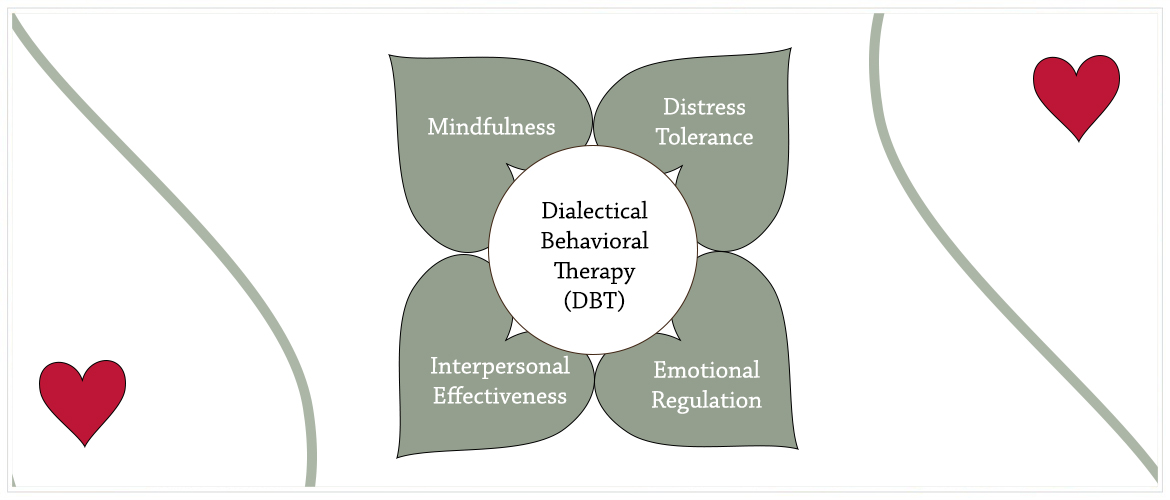
Dialectical Behavioral Therapy (DBT)
Introduction
In the journey towards emotional well-being, it's essential to have effective tools and strategies to address the complex challenges life may throw our way. Dialectical Behavioral Therapy (DBT) has emerged as a powerful therapeutic approach designed to help individuals navigate the complexities of their emotions and behaviors. In this article, we will explore what DBT encompasses, its core principles, and the wide range of conditions it can effectively address.What is Dialectical Behavioral Therapy (DBT)?
Dialectical Behavioral Therapy, or DBT, is a comprehensive and evidence-based psychotherapy framework that combines elements of cognitive-behavioral therapy (CBT) with Eastern mindfulness practices. Created by Dr. Marsha Linehan in the late 1980s, DBT was initially developed to treat individuals with borderline personality disorder (BPD). However, it has since proven highly effective in addressing a variety of emotional and behavioral difficulties.The Core Principles of DBT
DBT is built upon several fundamental principles, including:
- Dialectics - DBT employs the concept of dialectics, emphasizing the idea that seemingly contradictory truths can coexist. It encourages individuals to balance acceptance and change, validating their experiences while also seeking personal growth.
- Mindfulness - Mindfulness skills are central to DBT. They help individuals cultivate awareness of their thoughts, emotions, and sensations in the present moment, without judgment.
- Emotion Regulation - DBT equips individuals with strategies to identify, understand, and manage intense emotions in a healthier and more constructive manner.
- Interpersonal Effectiveness - DBT teaches effective communication and relationship skills to improve interpersonal interactions, resolve conflicts, and build more fulfilling connections.
- Distress Tolerance - This component of DBT focuses on learning how to tolerate distressing situations and emotions without resorting to self-destructive behaviors.
Conditions DBT Can Help Address
Dialectical Behavioral Therapy has demonstrated its effectiveness in treating a wide range of mental health conditions and emotional challenges, including:
- Substance Use Disorders - DBT has been adapted for addiction treatment, assisting individuals in managing cravings, reducing substance use, and building healthier coping strategies.
- Depression - DBT's emphasis on emotion regulation and mindfulness skills can be beneficial in managing depressive symptoms and preventing relapse.
- Anxiety Disorders - DBT provides tools for managing anxiety by enhancing emotional regulation and distress tolerance, reducing the impact of anxiety on daily life.
- Eating Disorders - For conditions like bulimia nervosa and binge-eating disorder, DBT addresses emotional dysregulation and helps individuals develop a healthier relationship with food and their bodies.
- Self-Harm and Suicidal Ideation - DBT's distress tolerance skills are particularly helpful for individuals struggling with self-harming behaviors and suicidal thoughts, providing alternatives for coping with intense emotions.
- Post-Traumatic Stress Disorder (PTSD) - DBT can be integrated into trauma therapy to help individuals process traumatic experiences and develop skills for managing distressing memories and emotions.
Conclusion
Dialectical Behavioral Therapy (DBT) stands as a transformative and holistic approach to enhancing emotional well-being and promoting personal growth. Through its emphasis on mindfulness, emotion regulation, interpersonal effectiveness, and distress tolerance, DBT offers individuals a comprehensive toolkit for navigating the challenges of life. Whether you are dealing with borderline personality disorder, addiction, depression, or other emotional difficulties, DBT can empower you to lead a more balanced and fulfilling life. Contact Attend Mental Health to determine if DBT is the right fit for your unique needs and circumstances.Back to Our Treatment Focus
